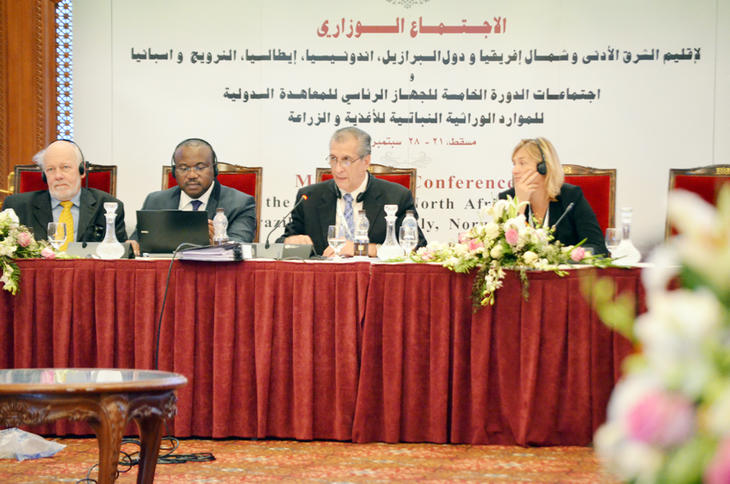
Fifth Session of the Plant Treaty’s Governing Body, Oman, 2013
The Fifth Session of the Governing Body of the International Treaty on Plant Genetic Resources for Food and Agriculture (ITPGRFA) was held in Muscat, Oman, 24-28 September 2013. It adopted a resolution on Farmers’ Rights, Resolution 8/2013 (PDF), which represented a new approach to the Secretariat’s role: Whereas the Secretariat had previously compiled submissions from Contracting Parties and other stakeholders and disseminated these compilations at the Treaty website, it was now requested to review the knowledge, views, experiences and best practices that had been submitted since the entering into force of the International Treaty. It was requested to derive examples, in a systematic way, as options for the national implementation of Article 9 on Farmers’ Rights to be presented at the next session of the Governing Body in 2015 in Rome.
This was the result of a lengthy discussion at GB5 on whether and how the Governing Body could promote national implementation of Article 9 on Farmers’ Rights. Developing countries demanded voluntary guidelines and were supported by inter alia Norway. The idea was to set up a working group for developing such guidelines, including possibly a definition of Farmers’ Rights, but there was no consensus for that.
At the previous session of the Governing Body in 2011, the Ad Hoc Technical Working Group on Sustainable Use (ACSU) was – through Resolution 7/2011 (PDF) – given the mandate to take into account Resolution 6/2011 (PDF) on Farmers’ Rights. This was a response to the demand from many countries in 2011 to establish a working group for developing voluntary guidelines. Instead of setting up a separate group with that purpose, an established group was mandated to look into the realization of Farmers’ rights, by taking the resolution on Farmers’ Rights from GB4 into account. The formulation can be found in the resolution text, not the mandate itself. This positioning of the formulation in the resolution text instead of the mandate, may be the reason why Farmers’ Rights was hardly taken into account by ACSU. Resolution 7/2013 (PDF) refers solely to Article 6 and a reference to Farmers’ Rights can only be found in the annex to the resolution on a programme of work on sustainable use of plant genetic resources for food and agriculture. One of the adopted goals is to provide support to Contracting Parties and stakeholders to implement the provisions of Articles 5, 6 and 9 of the Treaty that are relevant for the sustainable use of plant genetic resources for food and agriculture. However, in the Programme of Work derived from these objectives, there is no mention of Article 9 or Farmers’ Rights. Even if the implementation of Article 6 can be seen as a strategy to realize Farmers’ Rights, the actual implementation of Article 9 was thus left aside and the mandate of ACSU in this regard was not fulfilled. In the terms of reference for ACSU for the subsequent biennial period (2013–2015) there was no mention of Farmers’ Rights either in the mandate itself or the text of Resolution 7/2013 (PDF). Thus, this was the end of the idea of having ACSU dealing with Farmers’ Rights.
Even though no consensus could be found for a working group on Farmers’ Rights, the language of Resolution 7/2013 is strengthened as compared to earlier resolutions on Farmers’ Rights. Contracting Parties were for the first time invited to consider developing national action plans for the implementation of Article 9. They were also invited to promote access to genetic resources under the Multilateral System of Access and Benefit-sharing to local and indigenous communities and farmers.
A new area of work was introduced at this session of the Governing Body: the Secretariat was requested to invite the Union for the Protection of New Varieties of Plants (UPOV) and the World Intellectual Property Organization (WIPO) to jointly identify possible areas of interrelations among their respective international instruments, as UPOV was considered to affect the implementation of Farmers’ Rights and vice versa.
In line with the previous resolution from GB4, the Governing Body also invited Contracting Parties that had not already done so, to consider reviewing and as appropriate adjusting its national measures affecting the realization of Farmers’ Rights to protect and promote these rights. Also other provisions from previous resolutions were maintained, such as organizing regional consultations, facilitating support for the work – among others from development cooperation agencies – and last but not least, to involve farmers’ organizations in the work.
Several side events on Farmers’ Rights and related matters were conducted at GB5, inter alia presenting work that had been carried out since the last session of the Governing Body, as reflected here. Following GB5, processes were initiated and new initiatives taken in preparation for GB6 in 2015, as reflected here.
Text by Regine Andersen